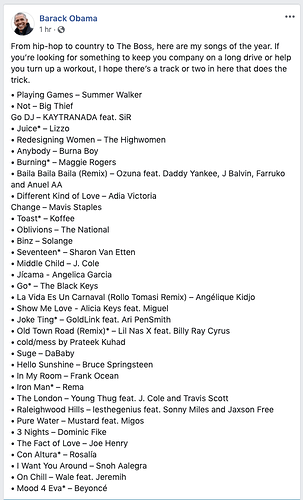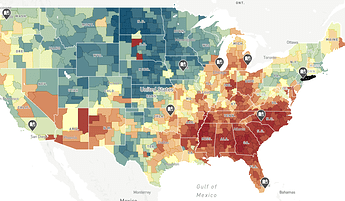Definitely interesting to see youtubers that have moved to Raleigh and spend a great deal exploring the city. This dude has some great videos about his experience moving from Austin to Raleigh.
Below video features the Transfer Company.
Terrific article for the Triangle, Raleigh , and NC State, the latter of which often gets ignored on the national stage compared to its “blue-blood” sisters.
What other Raleigh does anyone care/know about though
This is a response to an old comment btw.
Raleigh, MS is another one.
Raleigh County, West Virginia.
Obama’s Favorite Music of 2019 includes J. Cole and a band and song about Raleigh: Raleighwood Hills (feat. Sonny Miles & Jaxson Free)
My friend, Jaxson free is featured on Raleighwood Hills. This is crazy
Okay, who’s going to be the hero who ID’s all of the locations used in the Raleighwood Hills video? I mean, obviously a lot of it was shot in Dix Park, but can anybody definitively ID any of those streets and street corners?
They’re in Oakwood.
The porch of the Tucker House:
A house on the corner of Person and Oakwood:
Bloodworth and Polk:
I knew the community here would never let me down. A++ work, @Tenkai!
No problem! This is my block… or the one right next to it. I recognized the locations in it almost immediately.
Never thought I’d get to say that spots in a rap video are on “my block”, but here we are.
Here’s something a little less positive. It’s a couple months old, but don’t think I saw it posted.
https://www.charlotteobserver.com/opinion/opn-columns-blogs/article236778738.html
A Charlotte path that Raleigh should follow
Back in 2014, when the Harvard economist Raj Chetty unveiled his remarkable project on economic mobility in the United States, North Carolina’s largest city ranked dead last among the fifty biggest metro areas in the country. Chetty’s data found that a child born in poverty in Charlotte is extraordinarily likely to stay poor into adulthood, with far fewer chances for advancement than a child born in Salt Lake City or San Jose.
[…] But instead of ignoring the mobility findings or responding defensively, Charlotte embraced the challenge. Collier and his colleagues launched a years-long effort called Leading on Opportunity, pulling together city and county government, nonprofits, churches and businesses big and small to figure out what keeps the American Dream out of reach for low-income residents. They called in UNC Charlotte’s Urban Institute to analyze data and tackle research problems — everything from preschool access to neighborhood segregation to corporate hiring practices.
[…] Charlotte has already made new investments in housing and is mapping plans for dealing with transit issues, but that’s only the beginning. “This takes a while to penetrate,” Collier said. “This is generational work.”
Which is why cities other than Charlotte need to get moving. The Queen City may have ranked dead last, at No. 50, but the City of Oaks didn’t exactly earn bragging rights. Raleigh clocked in as 48th worst in the country for economic mobility, statistically indistinguishable from our Mecklenburg cousins. Yet there’s been no comparable mobilization of civic leaders here, no all-hands-on-deck effort to figure out why poor children stay poor and what we can do about it.
It doesn’t take a Harvard genius to figure this one out.
Look at how Asian immigrants prosper so well. Guys move here from China and other places with barely anything to their name. Communities that have faced vastly harder conditions that anyone in America and endemic poverty where they’re from. But they’ll move to a place NYC and start selling vegetables on a corner. And start moving up.
What is it? It’s a mindset. That’s what we all control. Once you set your mind to it, anyone can prosper in America. Immigrants from all around the world have been proving it for generations.
So what’s holding back black populations in America? White privilege? Lack of opportunity? Those explanations fell away a long time ago, as proved by the success of everyone else of all races and cultures that do so well here. What’s the difference? Mindset.
You could throw another billion dollars into inner city Baltimore and Durham and double the unionized public school teacher salaries. Would it make a difference? It sure hasn’t in the past. The article above talks about more public housing. LOL more failure and doing the same thing. The UNC Urban Institute says 'preschool ain’t free enough! (i.e. don’t have babies until you can afford them) or neighborhood segregation (Asian neighborhoods and Hispanic neighborhoods do very well as it is)… or ‘Corporate Hiring Practices’… really? How do you hire black kids if they are cultivated in a manner that doesn’t produce hire-able people? They need to change their mindset.
It won’t until that entire community sets their mind to success and escapes the victim status that is holding them back. Liberal pieces like this article are the problem as they don’t even get to the heart of the problem. They look at the environment around the black community instead of questioning the culture and mindset.
Yikes. This forum is not the place for your ramblings. I say this as a supposed “model minority” (whose parents – like the vast majority of other Asian immigrants in our country – moved here already educated and affluent, by the way). Your understanding of race and social mobility are grossly simplistic and ignorant. Let’s keep this about Raleigh specifically, and not about your uninformed theories about race.
The fact of the matter is that there is a vast difference in social mobility throughout the country, and Raleigh ranks 48 out of 50. This difference is not due to us having a distinct racial demographic in our city; Raleigh does not have a higher percent of black people than other places, and it does not have less Asians than other cities that rank far higher than it. There are other structural elements specific to our city, and unrelated to its demographics, that led to this result. Or are you proposing that the black communities of Charlotte and Raleigh have a uniquely deadbeat culture? (Don’t answer that. That was a rhetorical question).
Yeah, this is borderline off topic so let’s bring it back home.
Everything I said is objectively true with decades of supporting evidence.
However, that report from Raj Chetty is like many of those other ‘city lists’ which show the best place to work, or ‘best place to raise a family’ lists - a mashup of selective data points and biased opinion.
He basically shows the well known ‘belt of poverty’ across the southeast. Nothing new there. From there are unsupported rankings of cities to get an ordered list which shows Raleigh in the bottom tier of ‘economic mobility’.
But it’s pretty unconvincing presentation. Is he proposing that Raleigh is such a difficult place for poor children there to succeed (compared to other cities)?
What more can be done in a place that already has a strong civil rights history, has two of the top Historically Black Colleges, has a vast array of strong affirmative action programs with all the state jobs right in downtown, one of the best community college programs, and the largest state college also being in Raleigh, with it’s history of entrepreneurial mind set (SAS, Redhat, etc)… RTP being established over a half century back, opening paths for high tech jobs for all in the area.
I can’t see anyone buying the idea that Raleigh is at the bottom of the rankings for ‘economic mobility’ when it has so much going for anyone growing up there.


